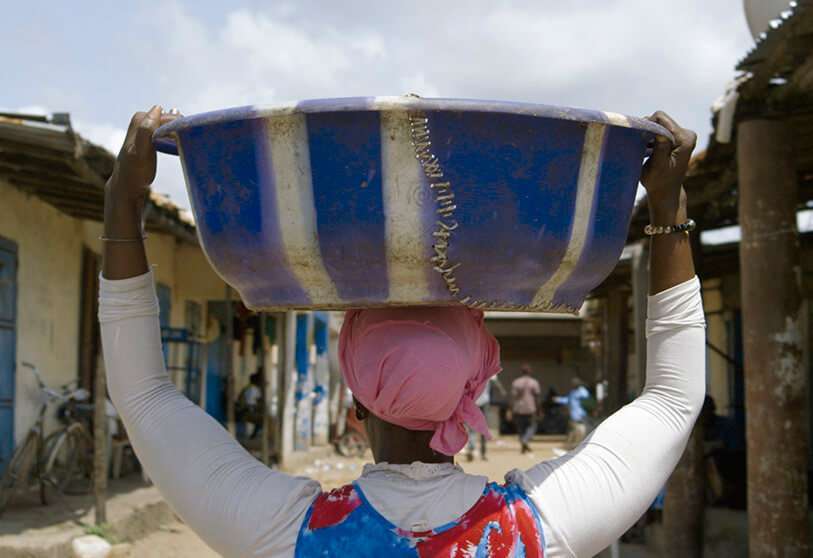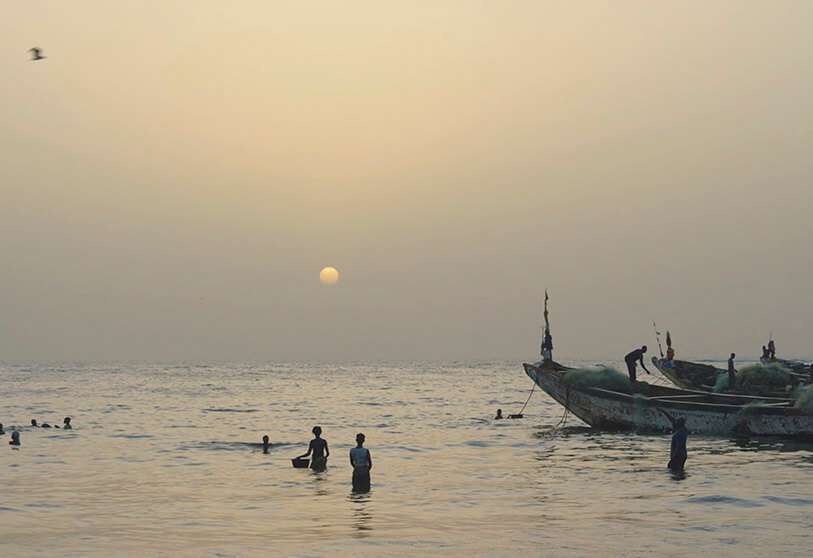Stolen Fish, the reality of fishing in Africa

"I never thought of leaving by the back door" could be the new slogan of the now famous Topmanta brand, created by the Manteros Union. They created the slogan "I didn't want to be a mantero" to denounce how Senegalese fishermen were forced to flee to Europe due to the presence of large Western fishing companies in their waters. However, this phenomenon is not isolated to Senegal; there are a total of fifty fish factories in West Africa and most of what they produce is exported to the EU and China. On this coast, the Gambia, with a population of two million people, has one of the highest rates of irregular migration to Europe. What Gambians call "leaving through the back door".
"The fishmeal industry is very opaque. You don't know for example how it travels from Gambia to Europe. You know that it is imported but you don't know which companies, it is not labelled. So when a consumer goes to the supermarket they don't know if the pork or fish they are eating was fed with this fishmeal, which is used as animal feed," explains Gosia Juszczak. It was by denouncing this that she came across the organisation Compassion in World Farming, an NGO whose aim is to end all intensive animal farming practices, and which "is going to use the film in the European Parliament to denounce the fishmeal industry".
Gosia's film is Stolen Fish, a project she conceived and directed, and produced by Minority Right Group International, which was presented at the African Film Festival in Tarifa last week. Not only there, but festivals in Poland, Croatia and even New Zealand, Bangladesh and Brazil have wanted to show Stolen Fish. "The film is based on these personal stories of very humble people who live it every day and who normally don't have many channels to talk about it. [...] with it you realise how important this issue is and how connected it is to migration, globalisation, colonisation, food security..." explains the director.

In this account, recorded from The Gambia, we get a glimpse not only of the current reality of the country, but of the coastlines of West Africa as a whole. "This is something that is often hidden from people in Europe and it is something that is not known, as China has dominated the countries of Africa. I see that if things don't change in the future; if Africa doesn't stand up against China, we are going to be a colonial disaster," laments Abou, one of the film's protagonists, who had his boat and lived off what he fished for before the arrival of Chinese factories in his waters. Abou, along with Mariama Jatta and Paul John Kamony, narrate in Stolen Fish what these factories have done to their lives.
"They came 2017, they started building the factories then, but it was in 2018 that they started with the massive illegal fishing practices" narrates Abou, who has since been standing up to the factories and his own government in order to protect Gambia's resources. "Most of my friends started selling their boats and their belongings, and they started trying to do something else because fishing didn't give you anything. You would go fishing and come back with a completely empty boat.

The animal welfare association denounces that in West Africa, fishmeal producers, often equipped with the best technologies in the fishing industry or offering higher prices for forage fish catches, compete with local fishermen and markets. This directly affects local communities, who depend on these small fish for their livelihoods. China is home to the world's largest aquaculture industry and is the main consumer and importer of fishmeal, and it is its factories that have led Abou to raise his voice to defend what was his livelihood and that of most Gambians. "I really liked being a fisherman, for my tribe it's not something you choose, it's something we carry in our veins," says the young man. However, the company's fishing practices forced him and most young Gambians to rethink their lives.
"Our sea is not very big because the country itself is small. We have the river that connects to the sea, where it is totally forbidden to fish, even for the Chinese, because this is the area where the fish reproduce. But they don't care, they fish there, hidden at night", criticises the Gambian activist. Not only that, but in Senegal and The Gambia, several cases of pollution from fishmeal production factories have threatened marine ecosystems, polluted waterways and damaged local fishing and tourism industries, reports Compassion in World Farming.
It was this phenomenon that made Abou and Gosia meet and start working together to show what is happening in The Gambia. "This documentary was a blessing for me," says Abou, "until then I had only been in local programmes and one national programme, and even then I started to have problems with my community and the government because I started to reveal everything that was going on. This made other local people react. I encouraged them to join us [fishermen].

Stolen Fish was produced by the Minortity Rights Group with financial support from the European Union, and co-produced by Compassion in World Farming and Rosa Luxemburg Stiftung Oficina de Enlace Madrid. The documentary has already been screened in dozens of festivals around the world and is intended to be used as evidence in the European Parliament against the abuse of fishing companies.
"It may be a bit cliché to say that you want to change the world through documentaries, but I do. And that's why I make the films and other kinds of projects, a little drop that contributes and that really now that it is travelling, after all the work it has taken, and that it is getting press, you realise how important it is," says Gosia from Slovakia, where she has just presented it at the One World Film Festival.

And as she rightly pointed out, overfishing in Africa "is so connected to migration, globalisation, colonisation, food security...". Since large companies began to settle on the African coasts, leaving thousands of fishermen, shopkeepers and other workers who made a living from fishing without work, more than 100,000 people have been forced to take the Canary Island route in order to find a life in Europe. So did Abou eight months ago.
Now, from Spain, Abou awaits a decision on his asylum application, "I had never in my life thought of going to Europe, but with the complaints I made I had to consider it because I started to receive threats from people in my own community due to pressure from the government, and I began to fear for my life". The activist has been fighting against the over-exploitation of resources in The Gambia by Chinese companies for a long time and has received threats for it, but as he became more and more visible and spread the message to other countries through Western journalists, everything intensified. "In Africa we have this culture and tradition of respect. You have to respect the elders. And they are very corrupted by these companies, and when you do this activism work, they try to block you".
Abou, like thousands of former fishermen from Gambia, Senegal and Mauritania, is hoping to regularise their situation in Spain. The overexploitation of resources by Western companies has worsened an already delicate situation, has increased migratory flows which implies a multiplication of mafias in charge of people trafficking, and Europe, for its part, has crowned itself as the 'Fortress Europe'; externalising borders, signing agreements with third countries to stop migratory flows without worrying about the human rights violations that these imply and denying asylum permits to the majority. As the director explains, "there are so many people migrating for economic reasons. So many fishermen have arrived. It is a direct cause and effect. It is no longer a hypothesis, it is a fact that has come true".
All that this phenomenon encompasses, moreover, polarises the population even more: "You are either for or against (migration), the moment the debate arises, it is already closed. But if you start talking about the issue in other ways through this intersectionality, showing that everything is connected, you manage to reach these people," explains Gosia. This is exactly what projects such as Stolen Fish achieve, "in Poland or Slovakia there is an extreme right-wing policy. And xenophobia comes from ignorance and it has been very interesting to show it to them", explains Juszczak excitedly, "if you don't start with migration but start with other issues, issues that people understand more, such as the environment or multinationals, people start to see it differently, with more understanding and comprehension". That is what Stolen Fish is doing.

More than 500,000 tonnes of small fish, essential for maintaining the food security of more than 33 million people in countries such as Mauritania, Senegal and The Gambia, are extracted from West Africa each year to be turned into feed for aquaculture and agriculture. China has become, like many other African nations, the Gambia's main trading partner. So much so that more than 50% of the country's exports are destined for the Asian giant and 34% of Gambian foreign purchases also come from China.
All this forced hundreds of thousands of fishermen like Abou to sell their boats and embark on their migratory route to Europe. This has turned the Canary Islands route into the deadliest in the world, accumulating more than 800 deaths in 2020 alone. The presence of Chinese companies in Gambia, as well as other countries in the rest of Africa, has changed the lives of Africans, leaving them without possibilities, the only one being to risk their lives to reach Europe. That is why, as Mariama says, "if I could talk to the factory owner, I would tell them to leave".








